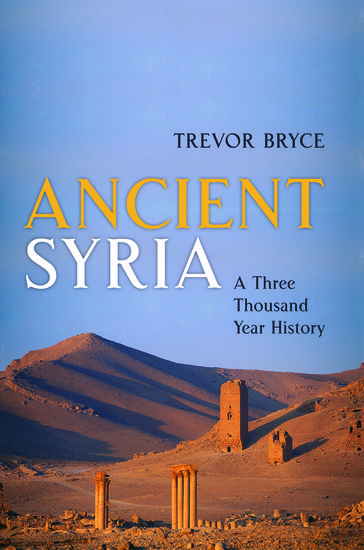By Trevor Bryce
I have long been fascinated with Syria. Like other Middle Eastern regions, it has many layers of civilization and has seen many conquerors and raiders tramp and gallop through its lands over the centuries. That of course has been the fate of lots of countries, ancient and modern. But there is something quite distinctive about Syria. It has often been called the crossroads of the ancient Near East, because through it passed some of the most important routes that linked Mesopotamia and lands further east with the land of the Nile, and the lands of the Mediterranean and the western world beyond it. That helps account for the rich cultural melting pot that Syria became, clearly reflected in its archaeological remains as well as in its written records. It also accounts for the wealth and affluence that characterized many regions and cities of Syria throughout its history. The downside of all this is that Syria provided killing grounds and plunder houses for many rapacious outsiders. Their quest was often not only for booty and plunder. Syria was strategically important. If you wanted to be a Great King in the Near Eastern world, you had to have control of Syria, or at least a good deal of it. That’s why so much of Syria’s history has to do with outsiders who fought one another for control of it, like Hittites and Egyptians and Assyrians and Babylonians and Persians and Macedonians and Romans. Syria suffered at least as much as it benefited from its international intruders.
When I visited the country several years ago, its modern cities, its museums, its ancient sites, I became deeply impressed, more than ever before, by the wonderful cultural heritage produced by a blend of so many diverse civilizations and passed on from the ancient to the modern land. We should never lose sight of this, especially in the midst of the country’s present tragedies. In asking the question why Syria is suffering so much today, we are inevitably led back into the region’s past. Was it always like this?

We can perhaps begin Syria’s story with the early appearance of writing there, some four and a half thousand years ago, in the palace archives of the northern Syrian city Ebla (about 2400 BC). (Of course, Syria’s archaeological remains go back much earlier than this.) Our written records provide us with many stories from ancient Syria, which can be woven into a continuous narrative extending from the Bronze Age to the late Roman empire, and indeed well beyond this. Hittites, Babylonians, Assyrians, Egyptians, Persians, Macedonians, and Romans all played their part in Syria’s history. Ancient Syria produced luminaries of its own, most notably, perhaps, Zenobia, ruler of the city of Palmyra, and for a brief time the most formidable challenger of the might of Rome. But all too briefly. Syria’s story can be seen as a kind of morality tale. For so often it serves to highlight the absurdity of human pretensions and ultimately the pointlessness of the lust for power which abruptly and violently ended the careers and lives of many who sought to impose their control upon the land. Almost inevitably, a historical narrative of ancient Syria (as this is) focuses on the ‘big people’ of the Syrian world and the outsiders who sought to control this world — the kings, the military leaders, the lords and princes, the usurpers, the elite bureaucrats — for it is with them that our written records are mostly concerned. Alas, we know little about the common people who formed the great bulk of this world’s populations, the people who produced many of its artistic masterpieces and generated much of its wealth – and who so often became the victims of those who ruled over them and plundered their possessions.
Syria has long been one of the most trouble-prone and politically volatile regions of the Near and Middle Eastern world. Can we learn from its history anything at all about what is happening now in the country? Answers to this question remain elusive. But it has to be said that history is not on the side of Syria’s ever being a land that will be allowed to live in peace. Outside forces have too much vested interest in it to let it be so. That at least, sadly, is one lesson its history does teach us.
Trevor Bryce is Honorary Professor and Research Consultant, University of Queensland and Emeritus Professor of the University of New England (Australia). He is the author of Ancient Syria: A Three Thousand Year History. He has held the posts of Professor of Classics and Ancient History, University of England, and Deputy Vice-Chancellor, Lincoln University (New Zealand), and fellowships and scholarships at various other institutions, including at Oxford, Princeton, Canberra, and Sydney. He is a Fellow of the Australian Academy of the Humanities, and a recipient of an Australian Centenary medal for services to history. He has specialized in the history and civilization of the ancient Near East, and has published many books and articles in this field.
The Oxford Atlas Place of the Year 2013 is Syria. The Oxford Atlas Place of the Year is a location — from street corners to planets — around the globe (and beyond) which has attracted a great deal of interest during the year to date and judged to reflect the important discoveries, conflicts, challenges, and successes of that particular year. Learn more about Place of the Year on the OUPblog.
Subscribe to the OUPblog via email or RSS.
Subscribe to only history articles on the OUPblog via email or RSS.


Recent Comments
There are currently no comments.